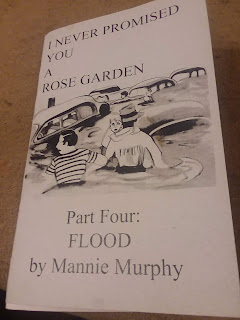Mannie Murphy's continuing zine series I Never Promised You A Rose Garden has been a fascinating, essential read. It can be best described as a thorough, detailed history of Oregon (and Portland in particular) and its problematic, white supremacist roots. In light of the mainstream rise of white supremacist movements in the US since Murphy began the series, it's all the more instructive and important to read. This isn't so much a comic as it is an illustrated zine, but Murphy's handwritten approach (in cursive, even) gives the zine a high level of intimacy. It also helps that Murphy is simply an excellent writer, matching an evenhanded approach with a slow, simmering passion.
Issue #3 is titled "Hatemongers," and it's about Murphy watching a 1988 episode of the Geraldo Rivera show that featured a white nationalist riot. A chair was thrown and broke his nose, but what really threw Murphy was realizing that some of the people on the show were local to Portland. In fact, they were key figures in the second issue of the series. The show was a white nationalist blueprint: find an excuse for provocation and then engage in extreme, shocking violence. It's also proof positive that there is no such thing as civil, rational discourse with white nationalists. They have a particular worldview based around the paranoid belief that they are the real victims, and everything they do and say is defensible because of this. Giving them any kind of attention and allowing them to act out is giving fuel to the movement, emboldening violence and even murder. Circling back 'round to Portland (and other police departments), such activities often go unpunished or even encouraged and sometimes propagated by the very police departments that are supposed to protect its citizens.
Issue #4, "Flood," is an account of an attack by local Cayuse native Americans on the settlement in what would become Portland. It was retaliation for the flood of white settlers intentionally bringing in disease in order to wipe out the natives. They also poisoned native food in an effort to bring about genocide, rather than try to convert the Cayuse. This was all part of establishing Oregon as a "white utopia," and it continued with laws specifically forbidding black people from staying in Oregon or Asians from emigrating there. Murphy carefully provides primary evidence regarding the ways in which public officials were cozy with the Klan and then connects it with the Bundy family's absurd "siege." The titular "flood" in the title refers to a flood of white settlers, but it also refers to a literal flood that destroyed the shoddy housing of Vanport. That was a small black town that popped up thanks to a new for labor in booming Portland, wiped out by a flood. Those black citizens trying to relocate were forced into a section called Albina, thanks to "white banks, realtors and homeowners systematically denying rights based on skin color."
Murphy notes that Albina became a tight-knit community that thrived in spite of its disadvantages, but capricious police murders of black citizens went largely unpunished. Even when officers were suspended or fired, the cops would assemble en masse to protest in a show of force, usually effecting the reinstatement of these cops. Even one police captain was reinstated after definitive links to Nazi groups were established. What Murphy does best is connect the dots: relentlessly, grimly, and with great precision. Terms like "white supremacy" aren't simply thrown around; they are grounded and documented with a powerful grip on history and the way it echoes and ripples down to the present. Murphy is also quick to note the history of resistance and resilience to oppression and is careful to document this resistance in as much detail as they do the sheer, naked brutality of white supremacy. This zine is a document of that history and is an act of resistance in the sense that it seeks to prevent revisionist history from obscuring the real truth of Oregon's history, as well as expose the real and obvious connections to the white supremacist scourge that is openly rearing its ugly head.



No comments:
Post a Comment